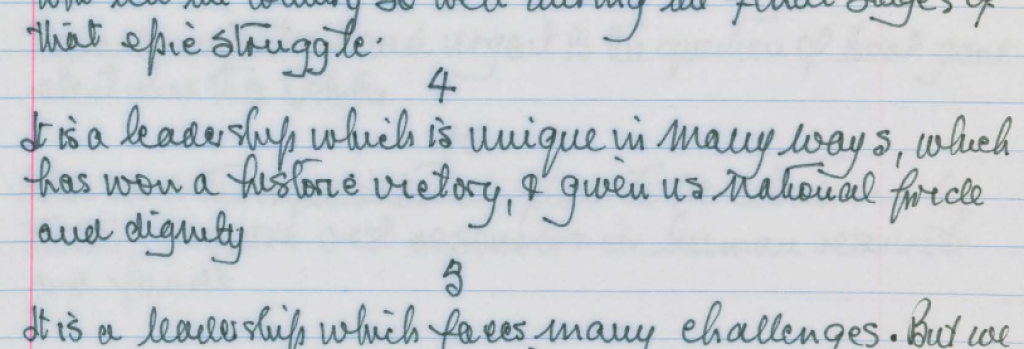This history and the legacy of vested interests, animosity fostered by apartheid’s policies and the violence it fomented, made the situation in KwaZulu-Natal a daunting one. Building on efforts started during the negotiations period, the approach had three elements: peace was to be made the dominant theme of politics; traditional leaders were to be extricated from party political control; and security action was to be driven by intelligence.
Natal had been an early proving ground for attempts to put peace at the heart of political discourse. The National Peace Accord, signed in September 1991, was largely modelled on early initiatives in Natal like the Lower Umfolozi Peace Accord concluded a year before. The aim was to involve civil society and all political parties with presence in working for peace, as Mandela explained in October 1990, speaking at the launch of the South African Democratic Teachers Union:
The violence our country has experienced in those two regions [Natal and the Reef] in particular has already wreaked havoc on the social fabric of communities in Natal and threatens to do so in the Reef. The ANC is committed to the process of removing the root causes of this violence, which are the poverty resulting from racially differentiated access to resources, the bantustan system and the hostel system. ...
The ANC has been unequivocal in its belief that a hidden hand is behind this violence. This hidden hand wishes to create a Renamo-type situation in our country. It has availed itself of people, some of whom are from Inkatha, who have had experience in Mozambique working with Renamo. It has trained people in the Caprivi Strip as well SA in the white suburbs of Johannesburg.
Our analysis of the present situation has led us to the conclusion that the state has embarked on a two pronged strategy: talk with the ANC to pull the country out of the mess created through decades of apartheid and weaken the ANC so that it cannot wrest power from the regime.
Our response to the present climate and strategies has been to continue insisting on peace as the first priority. The development of the ANC into the powerful grassroots movement, as we envisaged at the time of its unbanning, has been hindered by the outbreak of violence.
We are thus concentrating on the defence of our communities against the attacks launched by the various forces. At the same time we are placing a high premium on the attainment of peace at the local level. We have called upon our membership to resist provocation as far as possible. We have entered into a number of local and regional initiatives. This includes the Lower Umfolosi Regional Peace Accord which brings with it the promise of peace for people living in the Northern Natal region.
With the achievement of democratic government the search for peace could be strengthened by policy and policing initiatives. Mandela explained in the political report Mandela presented to the ANC’s December 1994 national conference.
In Natal, particularly, a desperate struggle by elements within the IFP to maintain a power-base among traditional leaders as an extension of the party does pose a danger of an eruption. The challenge for us in this regard is to ensure that traditional leaders are themselves liberated to become non-partisan servants of the people. ...
Just how acute Mandela assessed the situation to be, is expressed in his notes for his opening address to the ANC NEC meeting the following month:
1. I always find it most difficult to discharge this duty, because there is hardly anything new I can say that is not already known to all of you.
2. Except to say that the ANC has always been fortunate in that, right from its foundation, it had leaders of the highest calibre, first drawn from all sections of the African people, & thereafter extended to all population groups.
Working under very difficult, even dangerous conditions, they led our people fearlessly and skilfully, and created a proud tradition of struggle which successive generations inherited.
3. As is well known, the organisation was banned & we had to fight from underground, from exile and to a lesser extent from prison. It is this leadership, many of you who serve on this NEC, who led the country so well during the final stages of that epic struggle.
4. It is a leadership which is unique in many ways, which has won a historic victory, & given us national pride and dignity.
5. It is a leadership which faces many challenges. But we are confident that it will rise to expectations.
6. There is violence in Natal & many innocent people are dying – 12 in one day. Sydney and the Natal comrades are grappling with this problem, but they require our support.
Top leadership must be deployed in these dangerous areas. Adequate security measures should, of course, be taken. Nothing discourages people on the ground more than the continued absence of the top leadership in these problematic areas.



